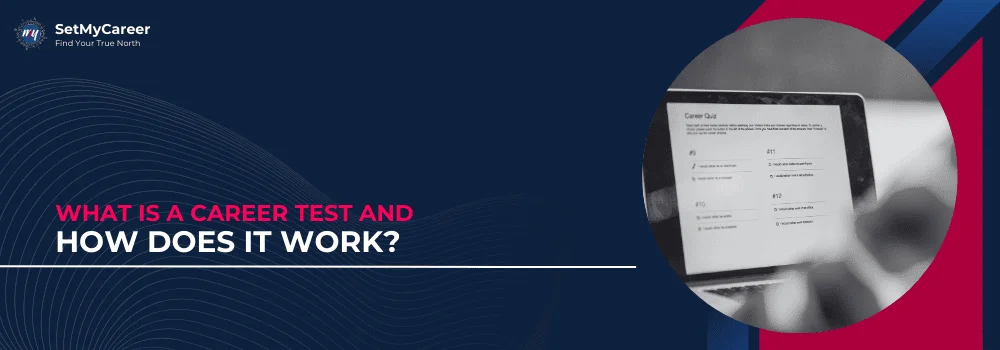
Published by Dr. Nandkishore Rathi on 13 March 2025
Chief Career Navigator
Dr. Nandkishore Rathi is passionate about identifying people's passions and helping them create and lead successful and fulfilling careers. With 30+ years of experience and interactions with thousands of students, academicians, and corporate executives, he has developed a range of career services aimed at benefiting individuals seeking a breakthrough in their professional lives.
Cracking the Code: This blog explores the Science and Psychology Behind Career Tests.

"What do you want to be when you grow up?"—a question we’ve all been asked, yet one that often feels impossible to answer. With countless career options and endless advice from parents, teachers, and friends, making the right career choice can feel overwhelming. What if you could take a scientific approach to discover the career that truly fits you?
That’s where career tests come in. These assessments go beyond personal opinions and guesswork, helping you understand not just what you like, but what aligns with your skills, personality, and long-term career goals. However, not all career tests are created equal—some are reliable and research-backed, while others can be misleading.
So, how do these tests work? Which ones should you trust? And most importantly, how can they help you make one of the biggest decisions of your life? Let’s dive in.
Figuring out how to choose a career can feel difficult, especially with the countless options available today. But what if there was a way to gain insight into careers that align with your strengths, interests, and personality? This is where career tests come in. Career assessments are structured tools designed to evaluate various aspects of an individual—including their skills, interests, personality traits, and work values—to help them make informed career choices.
Career tests fall under a larger category of psychological assessments, which include aptitude tests, intelligence tests, and personality assessments. These tests can be administered by certified career counsellors, psychologists, or trained professionals who interpret the results to provide valuable insights. While some career tests are designed for students choosing their first career path, others help professionals looking to switch fields or enhance their career growth.
So, how exactly does a career test work? Let’s break it down.
Career tests are created using years of research in psychology and career development. Experts design structured questions to measure your interests, personality, and abilities, ensuring the test accurately matches you with careers that fit. When you take the test, your responses are analyzed using patterns from large studies of people in different professions. This helps predict which careers align best with your strengths and preferences.
To ensure accuracy, scientists carefully test and refine these assessments, making sure they provide consistent and meaningful results. Just like a medical test needs to be precise to give the right diagnosis, a well-designed career test must be scientifically built to provide reliable career guidance.
No one can truly know their ideal career path without measuring it scientifically. Our interests and perceived alignments are often influenced by personal biases. For example, a student may want to become a doctor because they enjoy biology. However, simply liking a subject does not mean the career is a good fit. Being a doctor involves structured work, long hours, emotional resilience, and a strong sense of service—factors that must also align with a person's personality and abilities.
Additionally, it is impossible for an individual to consider every relevant factor when choosing a career. Career tests step in to systematically analyze multiple dimensions, ensuring that the choice is based on a well-rounded assessment rather than just assumptions or partial information.
One of the most common yet dangerous mistakes people make during career exploration is relying on others' opinions for career decisions. While advice from family and friends can be well-intentioned, it is deeply rooted in their own experiences, perspectives, and biases rather than objective facts. A career test offers a structured, unbiased approach, ensuring that your career choice is truly aligned with who you are.

Career tests are open to anyone experiencing career confusion—whether you’re a student exploring options, a professional considering a switch, if you're looking to restart your career after a break, or someone looking to grow in your current field. If you feel uncertain about your career path, a well-structured test can help you gain clarity by providing insights based on your unique strengths and preferences. No matter which career stage you are in, if you're still wondering how to be successful in life, it is high time you get measured for success.
However, it’s important to take a test that is designed for your age group, background, and career stage. A test meant for students may not be suitable for experienced professionals, and vice versa. Choosing the right test ensures you receive accurate and useful guidance tailored to your needs.
Career tests can be broadly categorized based on the way they are conducted and what they assess.
Online Career Tests – Easily accessible and can be taken from anywhere. Some are free, while others require professional analysis. However, not all online career tests are scientifically validated, so it’s crucial to choose a test that is research-backed.
Offline Career Tests – Often conducted in career counseling centers under professional supervision, ensuring personalized and accurate insights.
A career interest test focuses on what you enjoy doing rather than what you are currently skilled at. They help identify careers that align with your hobbies, passions, and natural inclinations.
A personality assessment test evaluates your behavioral traits, social interactions, and work preferences. Understanding your personality can help in finding roles that match your temperament, such as whether you prefer structured environments or creative freedom, independent work, or teamwork.
An aptitude test for career, measures your natural talents and capabilities, helping determine which careers may come more naturally to you. These tests assess areas such as logical reasoning, numerical ability, verbal skills, and spatial reasoning.
Your work values—whether you prioritize job security, work-life balance, personal growth, or financial success—are crucial in career decision-making. Values-based tests help you understand what aspects of work life are most important in your career vision.
A standardized career test is developed using scientific principles such as validity, reliability, and cultural relevance. This means the test has good psychometric properties and is appropriate for the age, gender, and cultural background of the person taking it
In contrast, non-standardized career tests (such as random online quizzes) often lack scientific backing, making their results unreliable.
To understand this, think of career tests like medical check-ups. A doctor wouldn’t diagnose a patient with a random thermometer—they use scientifically tested medical tools. Similarly, career tests need psychometric properties (such as validity and reliability) to ensure their results are meaningful.
Another factor for consideration is the importance of cultural fit. A career test designed for Western job markets may not be relevant for someone in India, where job expectations, work environments, and education systems differ. This is why it’s essential to take a test tailored to your region, age group, and background.
While career tests can be powerful tools, there are some things to consider:
Not all career tests are reliable – Many free online career tests may seem helpful, but they are often not standardized, scientifically validated, or regulated. This means they can be misleading. Professional career assessments are built with scientific rigor and should be interpreted by experts.
Be honest with your answers – The most effective way to take a career test is to answer instinctively and truthfully. Overthinking or choosing answers based on what you think is “right” can lead to inaccurate results.
Professional interpretation matters – A career test alone is just data. Career counselors help interpret the results, explaining what they mean in real-life career choices. This ensures that your results lead to informed decisions rather than confusion.
A career test is a valuable tool, but it is most effective when used as part of a larger career exploration process. The best approach is to combine a reliable career test with professional career guidance to gain accurate insights. Whether you are a student deciding on your career path or a professional looking for a change, understanding your interests, strengths, personality, and values through a career psychometric test can set you on the path to success.
A career is not just about what you can do—it’s about what you love to do, what you’re good at, and what aligns with your long-term goals. With the right career test and proper guidance, you can find a profession that brings both success and satisfaction!
No. 14/595, 1st Floor, Nanjappa Reddy Layout, Koramangala 8th Block, Bangalore 560095